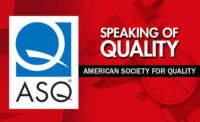Management
Why Quality Certifications Matter
Accreditation is critical to ensuring there is an effective quality management system that affords greater process control, reduces risk, and ulitmately results in increased customer satisfaction. And, thanks to the pandemic, it got a little easier.

Source: SimonSkafar/Vetta via Getty Images
Do quality certifications matter? It depends on who you ask.
Kimberlee Humphrey, president and CEO of the Association for Manufacturing Excellence, says that industry accreditations help employers hire qualified individuals and boosts employees’ value.
Matt Savas, team leader at the Lean Enterprise Institute (LEI), says that his organization does not advocate for certifications because certifications suggest someone’s learning is complete, while LEI believes that learning is continuous.

Jim Spichiger: Speaking of Certification
A conversation with Jim Spichiger, an ASQ Fellow and holder of nine professional certifications and a P.E. license.
Listen to more Quality podcasts.
“Certifications are often achieved through tests rather than hands-on improvement,” he said.
Jim Spichiger, program manager, Amazon and Lean Six Sigma Master Black Belt, touts their résumé-building potential.
Not only are they an independent, third party acknowledgement of your credentials, he says, they can signal to an employer an individual’s technical expertise and initiative and are transferable across industries.
“They can be a differentiator (a tie breaker) when assessing individuals for future roles and responsibilities,” he says.
Spichiger is referring specifically to ASQ certifications, which he says encompasses the broadest body of knowledge.
Speaking of body of knowledge, or BoK, Spichiger says a BoK is the complete set of concepts, terms and activities that make up a professional domain, as defined by the relevant learned society or professional association. The BoK is used to develop an exam that will assess a candidate’s knowledge of the concepts, terms and activities that make up a professional domain.
Each ASQ certification has a well-defined BoK that is reviewed and updated between every five and seven years, he explains.
And, he says, ASQ certification exam questions are based on published information that has been validated by two or more subject matter experts.
“This means that the questions are not abstractly developed but based on reliable, fact-based information that is commonly available to anyone,” says Spichiger.
ASQ Certification is earned accreditation by the American National Standards Institute (ANSI) National Accreditation Board against the International Organization for Standardization (ISO) 17024, says Michael Byrnes, executive director certification operations, ASQE.
This means that the questions are not abstractly developed but based on reliable, fact-based information...
“ASQ’s quality-based certifications are the only quality industry certifications to earn such global recognition by ANSI which separates ASQ from the competition and distinguishes quality professionals,” he says.
As such, accreditation is critical to ensuring that there is an effective quality management system that affords greater process control, reduces risk, and ultimately results in increased customer satisfaction and sustainability of products and services.
“Having a reputable recognized third-party accreditation such as ISO/IEC 17024 is necessary for credibility, protects the customer’s investment, and offers reassurance that there is independent oversight,” Byrnes says.
Of course, ASQ is not the only certification player. The Association for Manufacturing Excellence offers a lean certification process, created by lean practitioners who focused on the skills and capabilities people need to lead their organizations’ continuous improvement practices, Humphrey says.
“There are three levels of maturity (bronze, silver and gold),” Humphrey says of AME’s process. “It was developed in partnership with the Society of Manufacturing Engineers and the Shingo Institute. It’s an outstanding way to test knowledge level, learn more skills and become fully qualified and capable to lead organizational improvement endeavors.”
ASQ certifications are dependent on an individual’s role and their professional goals. For example, an auditor would benefit most from a Quality Auditor certification, while an inspector would get the most out of a Certified Quality Inspector certificate, says Spichiger.
“For a seasoned, high-level quality professional the most important certifications for them would be the Certified Quality Manager/Organizational Excellence and the Six Sigma Master Black Belt,” he says.
ASQ offers 18 professional certifications for quality professionals, designed to help with individual career advancement.
The credentials concentrate around disciplines in quality engineering, quality auditing, quality management, technical and inspection, Six Sigma, and quality fundamentals,” Byrnes says. “Each Certification has a unique Body of Knowledge and focuses on the core knowledge, skills, and abilities of the practice. It is important to note that ASQ Certifications focus on core competencies and are purposefully designed to be industry impartial. This ensures that no industry is presented with an unfair advantage during testing.”
ASQ certification programs have not considerably changed in recent years, Byrnes says, but each certification program undergoes a robust job analysis and development cycle every five to seven years to ensure the BoK and examination are aligned with current practices.
Thanks to the pandemic, remote proctoring administrations have also become more common, making testing more safe and secure.
“Prior to the pandemic, certification exams were taken at Prometric test centers available around the world and most ASQ certification exam preparatory courses were already available in a virtual format,” Spichiger says. “At the outset of the pandemic, ASQ was able to pivot and devise a virtual method to have a certification exam proctored from people’s homes.”
This pivot allows for quality professionals to take tests at home, and even allowed for ASQ testing to grow internationally.
“In the end, the credentialing industry, which had largely resisted moving towards live remote proctoring for many years due in part to security concerns, had been positively disrupted by the pandemic,” Byrnes says.
Looking for a reprint of this article?
From high-res PDFs to custom plaques, order your copy today!






